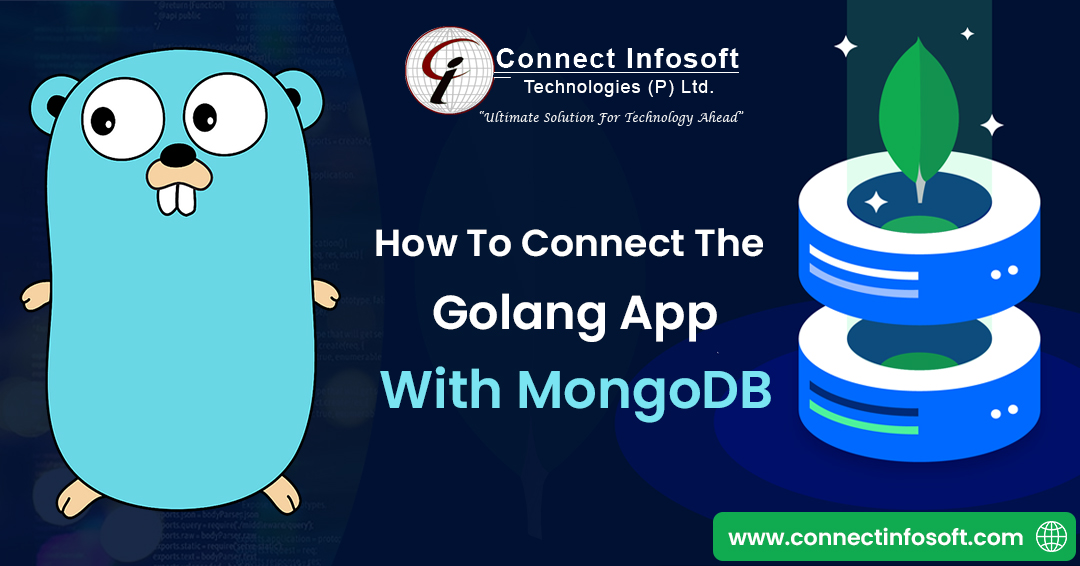Article -> Article Details
| Title | How to connect the Golang app with MongoDB-Connect Infosoft |
|---|---|
| Category | Computers --> Artificial Intelligence |
| Meta Keywords | Looking for Golang Development Service Company in India, Connect Infosoft, Golang Web Development Company, Looking for Golang developers in India, Hire Golang Development Company India, Hire Golang Developers Team Company |
| Owner | Sanjay Sahoo |
| Description | |
|
MongoDB, a popular NoSQL database, offers flexibility, scalability,
and performance, making it an excellent choice for many applications. If you're
developing a Golang
application and want to connect it with MongoDB, this comprehensive guide
by Connect Infosoft will walk you through the process. By following these
step-by-step instructions, you'll be able to establish a seamless connection
between your Golang app
and MongoDB, enabling efficient data storage and retrieval. Step 1: Install MongoDB
and the MongoDB Go Driver Before connecting your Golang app with MongoDB, you need to
have MongoDB installed on your machine. Visit the MongoDB website
(https://www.mongodb.com) and follow the installation instructions for your
operating system. Next, you'll need to install the MongoDB Go driver, which
provides the necessary tools and APIs to interact with MongoDB from your Golang
app. You can install the driver using the following command: go get go.mongodb.org/mongo-driver ``` Step 2: Import
Dependencies and Establish a Connection In your Golang app's code, import the required packages for
MongoDB connectivity: ```go import (
"context"
"go.mongodb.org/mongo-driver/mongo"
"go.mongodb.org/mongo-driver/mongo/options" ) ``` To establish a connection with MongoDB, create a client and
pass the MongoDB connection string as the argument: ```go func connectToMongoDB() (*mongo.Client, error) { clientOptions :=
options.Client().ApplyURI("mongodb://localhost:27017") client, err :=
mongo.Connect(context.Background(), clientOptions) if err != nil { return nil,
err } return client, nil } ``` Make sure to replace "mongodb://localhost:27017"
with the appropriate connection string for your MongoDB instance. Step 3: Perform CRUD
Operations Once the connection is established, you can perform CRUD
(Create, Read, Update, Delete) operations on your MongoDB database. For example, to retrieve documents from a collection named
"users," you can use the following code snippet: ```go func getUsers(client *mongo.Client) ([]User, error) { collection :=
client.Database("your_database_name").Collection("users") cursor, err :=
collection.Find(context.Background(), bson.M{}) if err != nil { return nil,
err } defer cursor.Close(context.Background()) var users []User if err :=
cursor.All(context.Background(), &users); err != nil { return nil,
err } return users, nil } ``` Note: Replace "your_database_name" with the actual
name of your MongoDB database. Also, ensure that you have a struct defined for
the "User" type. Similarly, you can write functions for inserting, updating,
and deleting documents using the MongoDB Go driver's APIs. Step 4: Handle Errors
and Close the Connection It is essential to handle errors appropriately and close the
MongoDB connection when you're done using it. Defer the closure of the
connection to ensure that it is closed after your operations are completed: ```go func main() { client, err :=
connectToMongoDB() if err != nil { log.Fatal(err) } defer
client.Disconnect(context.Background()) // Perform your
MongoDB operations here } ``` Conclusion: Congratulations! You've successfully connected your Golang
app with MongoDB using the MongoDB Go driver. Now you can leverage the power of
MongoDB's flexible document model and scalable database architecture in your Golang
applications. Remember to handle errors, close the connection properly, and
follow best practices for secure database interactions. Connect Infosoft specializes in Golang
application development and can assist you in seamlessly integrating your
Golang app with MongoDB. Our experienced developers have expertise in building
robust and scalable applications that leverage the power of MongoDB for
efficient data management. Contact Connect Infosoft today to harness the full
potential of MongoDB and Golang for your application needs.
Tags: How to
connect the Golang app with MongoDB, Looking for Golang Development Service
Company in India, Connect Infosoft, Golang Web Development Company, Looking for
Golang developers in India, Hire Golang Development Company India, Hire Golang
Developers Team Company | |

